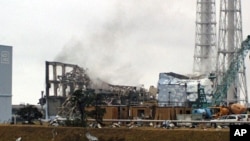The International Atomic Energy Agency, or IAEA, said Wednesday there are positive developments at a stricken nuclear power plant in Japan, but that it remains a serious concern.
Briefing reporters in Vienna, senior IAEA official Graham Andrew outlined improvements in the overall situation at Japan's crippled Fukushima Daiichi power plant northeast of Tokyo.
"There are some positive indications on the site, precautionary restrictions around the site on certain food stuffs have been put in place and monitoring of the environment continues to expand beyond the evacuation zone and out to sea," said Andrew. "Overall, no significant risk to human health has been identified."
But Andrew cautioned that the situation remains a serious concern. His remarks come as fears mount in Japan about the fallout of the Fukushima Daiichi power station, which was damaged by this month's earthquake and tsunami. The Japanese government has warned that radioactive iodine has been detected in Tokyo's tap water at more than twice the level considered safe for infants. This has prompted anxious buyers to clear store shelves of bottled water and government officials to plead for consumer restraint and calm.
Researcher Gerhard Wotawa of the Vienna-based Central Institute for Meteorology and Geodynamics says that the radiation released from the Fukushima power plant has been about the same as the radiation released in Ukraine's Chernobyl nuclear accident in 1986 - but with an important difference.
"Chernobyl did not lie close to the Pacific Ocean and the wind did not go into the ocean in that direction," said Wotawa.
That, Wotowa says, has limited the harmful effects of the radiation leaks. He also notes that there has not been a major explosion at the Fukushima power plant. But he warns that high levels of radioactive cesium remain a concern.
Experts Cite Improvements and Dangers at Crippled Japanese Nuclear Reactor
- By Lisa Bryant




